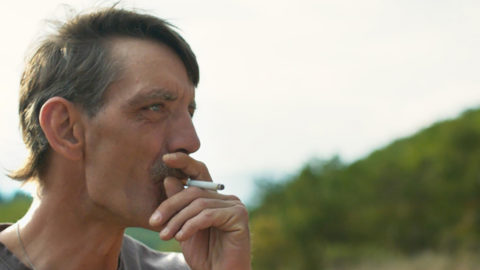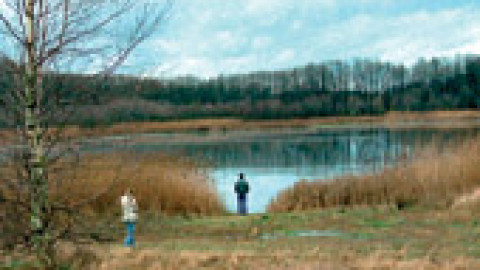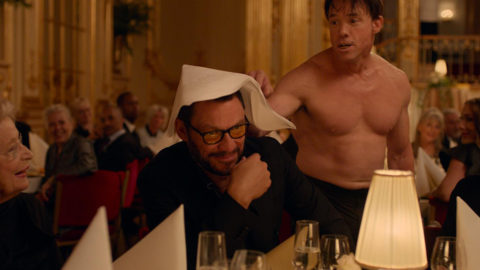Film of the Week: Western
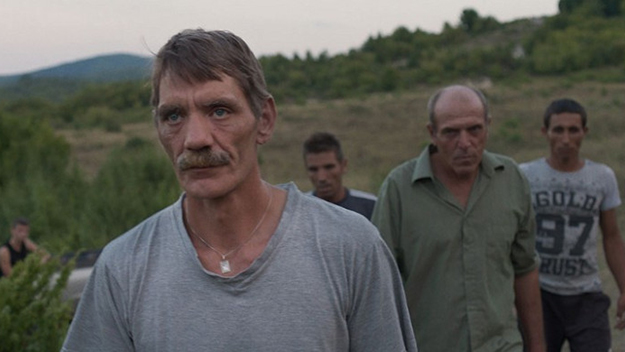
One of the best films to premiere last year, Western is probably also the best film since Claire Denis’s Beau Travail to be made by a woman about men (indeed, about men who are without women, most of the time). Like that film, it’s also about men at work—about breakin’ rocks in the hot sun, as the song goes, although the Eastern European climate in Valeska Grisebach’s film is somewhat more moderate than the pitiless desert where Denis’s legionnaires toiled.
Western is a long-overdue third feature from Grisebach, a German writer-director who made a big splash in the Berlin Festival of 2006 with her second, Longing. Her follow-up is very different, although like Longing—about a small town firefighter wavering between his wife and another woman—it has an acute feel for the complexities of unarticulated male emotions. It’s also more directly a political film and, dealing as it does with Germany’s present, its past and its place in the contemporary European economy, it’s close in some ways to Maren Ade’s Toni Erdmann (Ade is one of Western’s producers). Ade’s film showed German executives feeding handsomely on the resources of Eastern Europe, in that case the Romanian market. But instead of the economy’s commanding officers, as it were, Western is about its foot soldiers, the manual workforce.
Its characters are the members of a German team of construction workers sent to a secluded rural landscape in Bulgaria, close to the Greek border; their mission, which seems to be very informally organized, is to construct a power station by a river. As soon as Grisebach and DP Bernhard Keller give us our first wide shot of a pine-forested landscape under a vast summer sky, near the start of the film, we understand the title: these could be the heights of Colorado or Montana. The workers are like frontiersmen in a tale of the Old West—and some of them act like it, seeing the local people as an indigenous presence to be treated with suspicion, or exploited.
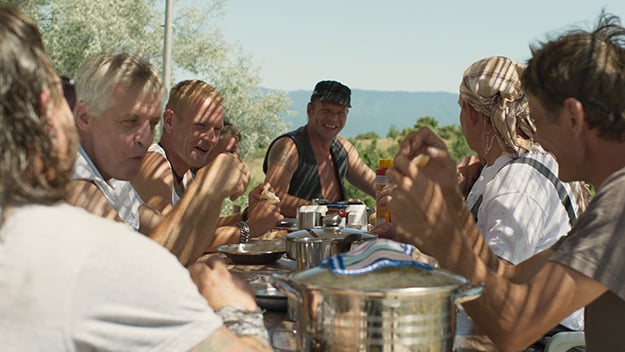
Grisebach’s tale of masculinity and cultural misunderstanding—the two themes seem naturally to go hand in hand here—plays constantly on the way that the landscape and its imagery, horses included, echo a classic genre. The central figure is Meinhard (Meinhard Neumann), a taciturn, rangy, mustachioed loner. He appears in the opening shot, going to meet his fellows at their temporary dorm in town; seeing him walking across a drab, featureless piece of urban parkland couldn’t make for a greater contrast with the magnificent open landscape he appears in next, where he seems to fit instantly. Grisebach has a way of signaling the essential to us in visual shorthand: we know the instant we see the group’s foreman Vincent (Reinhardt Wetrek) that he’s both in charge and almost certainly no good. His swaggering posture and his garb of faintly biker-ish cap, plus waistcoat with outsize buttons, worn on a bare chest, tell us not so much that he’s a leader as that he’s in love with the regalia of leadership.
As soon as the film reaches Bulgaria, Vincent is already leaning on Meinhard, the new hand. “You got skills or not?” he challenges him. “You a wise guy?” There’s a pause, and Meinhard, who could give Gary Cooper lessons in dignified taciturnity, simply says, “I’m here to earn money.” He’s there for more than that, though. Where his fellows seem content to sit around their mountaintop camp bantering and chugging beer, Meinhard is genuinely curious about the world he’s landed in, and has an independent way of discovering it. While the others are suspicious about the inhabitants of the nearby village—who are plenty curious about them—Meinhard clambers on a horse he finds grazing in the valley, and rides it into town. There he meets some locals who are curious to exchange information with him, however sketchily: the conversation starts out, and largely continues, in scraps of both languages, and a bit of signing. Some villagers speak German, though, and some are enthusiastic about German presence: “There used to be Germans here,” says one man. “During the war, they were orderly and neat.”
Meinhard’s cautious but open approach is far better than Vincent’s modus operandi. When the gang enjoy a day off relaxing by the river, a group of women appear on the opposite bank; when one loses her hat, Vincent’s idea of flirtation is to wade in, grab it and tauntingly refuse to return it to her, then forcibly duck her in the water. The women beat a disgusted retreat; although he doesn’t know it yet, Vincent’s claim to authority is forever damaged in the village. Eventually he apologizes, although typically he uses a negotiation session with the villagers as an opportunity to invite the woman, Viara (Viara Borisova), to dinner—although he actually addresses his suggestion to her uncle, like a Western settler seeing her as a chattel for barter. We don’t learn a great deal about Vincent—except that he’s bullish, fairly unprincipled and has a partner at home who, a painful phone call tells us, won’t give him any more chances to redeem himself. We also discover that he’s not above using bogus business speak: “We’re bringing infrastructure,” he says at one point as his way of justifying doing what he damn well pleases.
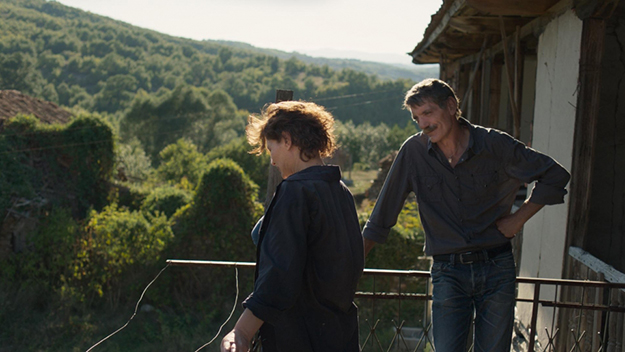
We don’t learn much about Meinhard, either—at least, no more than he chooses to reveal. Given a late night ride by some local men, he tells them he was a soldier in Afghanistan, a legionnaire. Asked if he’s ever killed someone, he simply makes a zipped-lip gesture. We take it on trust that Meinhard really has seen action—although later on, someone contemptuously suggests that he was an army chef, and there’s nothing to prove that he wasn’t. But the film certainly persuades us that Meinhard knows something about the world, and something painful, and that he doesn’t like to talk about it. Jumped by an aggressive Vincent, Meinhard holds back: “Violence isn’t my thing.” And apparently it’s not, although he hovers close to the border, at different points pulling a knife and a gun. But people respect and even fear him, because of his reserve and his bearing. He bonds easily with Adrian (Syuleyman Alilov Letifov), an affable wise guy who runs a quarry; confronted by a rival, Adrian shrewdly announces that Meinhard is his bodyguard; the latter instantly takes the cue to loom with a forbidding scowl, which does the trick. But Meinhard, if not exactly a softie, is sensitive too: in one scene, he’s gentle and courteous with a wizened village doyenne. And inevitably, it’s he—rather than would-be lothario Vincent—who gets a moment of twilit intimacy with Viara, a sophisticated woman who’s lived abroad and knows the ropes just as well as Meinhard does.
Western is essentially about territorial disputes, whether it’s Adrian and his rival arguing about the quarry, Vincent making an ill-advised “executive decision” about the rationed local water, or the two men vying for Viara’s attentions. The Germans even annex the valley, to all intents and purposes, by flying their national flag high on the hill, an act which—although it’s barely referred to directly—clearly causes bad blood. There are certainly pointed references to Germany’s past on both sides: “Grandma, a German is finally apologizing,” jokes a village boy whom Meinhard has accidentally knocked out. And Vincent quips, in a champion lapse of historical sensitivity, “We’re back—only took 70 years.”
The film has a nicely relaxed flow, which suggests a degree of improvisation. After the first few sequences of the crew at work, Grisebach shifts her attention to Meinhard’s interplay with the Bulgarians, with whom he starts to spend more time than with his co-workers; he even learns to thread tobacco leaves for drying. What’s remarkable about the film is the way that rapport emerges between Grisebach’s German and Bulgarian nonprofessionals, the characters communicating less through words they can understand in common than through nods, gestures, looks; the exchanged glares at a distance between Meinhard and Vincent are wonderfully telling, the slow-burning lit fuse that runs through the film. There’s a wonderful moment when Adrian tells Meinhard in Bulgarian that they’re going to understand each other just fine; Meinhard can’t possibly know what the words mean, but his smile shows that he does indeed understand Adrian perfectly. By the time Meinhard talks about his dead brother, and Adrian says that the two of them are now brothers, the latter’s comment is almost redundant: he’s just giving a name to a relationship we’ve seen developing all along.
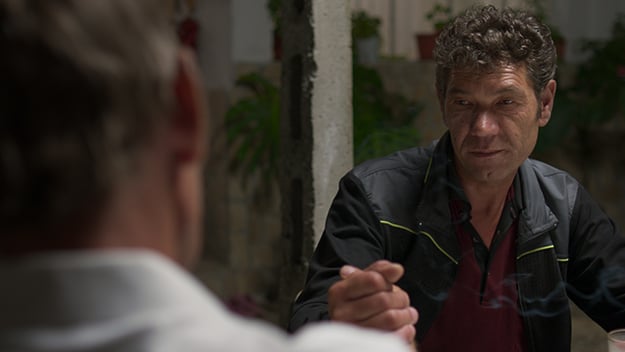
Western doesn’t end cozily with hugs and universal rapport. Meinhard may have won respect all around, but he has also pissed people off, Germans and Bulgarians alike. Another comparison with Beau Travail: the film ends with a man dancing alone, shaking off his demons to music (although nowhere near as frenetically as Denis Lavant). The superb nonprofessional casting is one of the film’s most eloquent features, communicating backstory as strongly as anything Grisebach could tell us explicitly. The characters’ movements carry their own muscle memory: Wetrek, who comes across as the strongest actor in conventional terms, is a scaffolder by trade, while Neumann is an automobile industry and construction worker. His languid but confident gait is pure Randolph Scott, while his face, usually unemotive, breaks out in deep creases on the rare occasions he smiles: it’s a John Ford landscape in itself.
Western opens February 16 at the Film Society of Lincoln Center and elsewhere. For more on Valeska Grisebach’s films, see Haden Guest’s essay in the January/February 2018 issue.
Jonathan Romney is a contributing editor to Film Comment and writes its Film of the Week column. He is a member of the London Film Critics Circle.



